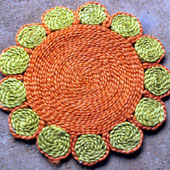Design Resource
Banana Stem
The Art of Crafting Banana Plantation
by
Introduction
Kerala is a land filled with banana plantation. Banana fibre is expensive and rare as its production is low. Due to the lack of availability of banana fibre, Sisal fibre is commonly used. The various products have traditionally been hand-made and they are available in bright and attractive colour combinations. A range of products are made up of banana stem, sisal fibre and kora grass.
Banana Fibre:
Banana fibre is extracted from the banana stem and is soft. It possesses high strength, small elongation, good lustre, light weight, fast moisture absorption capability and easily degradable. The average fineness of a banana fibre is 2386Nm, and the average fibre length is 60mm. Longer the length of the fibre, better is the quality of the fibre. Although Banana trees are in plenty in Kerala, the banana fibre required for this craft is procured from Kanyakumari which is located in Tamil Nadu. This craft was originally practiced for domestic purposes by the people of Kerala. These crafts are conducted in a village named Muhamma, located in Cherthala Taluk, Alappuzha district, Kerala.
Sisal Fibre:
Sisal, scientifically called Agave Sisalana, contains a rosette of sword-shaped leaves. Its stalk measures about 1.5 to 2 meters tall, with golden brown fibre. The fibre is widely used in making ropesand twines, because of its strength, exceptional durability, ability to stretch,low maintenance requirement, affinity for certain dyestuffs, and resistance to deterioration in saltwater. It grows predominantly in the places with hot climate-
Kora Grass:
This is largely found in Orissa and is locally called as Kora Grass. This grass is also available in Tamil Nadu. Kora Grass is hard, rough and durable. It is used as a base material for cushions and baskets, due to its durability and robustness. They may be dyed as per requirement.












